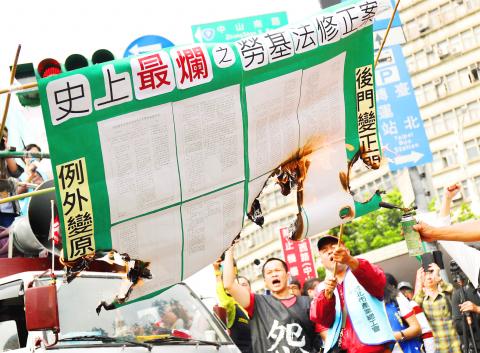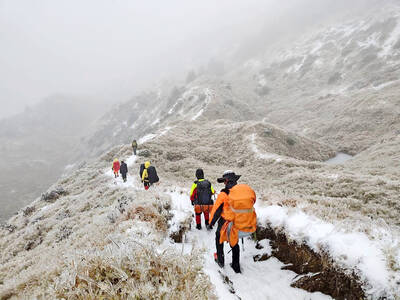Hundreds of workers and representatives of dozens of labor rights groups yesterday rallied in front of the Executive Yuan in Taipei to protest proposed amendments to the Labor Standards Act (勞動基準法), which they said would set back working conditions by 30 years.
The proposal is the “worst” piece of labor legislation as it would raise the ceiling on the number of consecutive working days from six to 12 days, while allowing industries to lower the minimum rest time between shifts from 11 hours to eight hours, they said.
The amendment runs counter to President Tsai Ing-wen’s (蔡英文) pledges to lower overall working hours while increasing salary levels, protesters said.

Photo: CNA
Medical Industries Union chairperson Chen Yu-feng (陳玉鳳) said medical professionals are regularly overworked and sleep-deprived as they are rarely allowed proper rest time between shifts, and the amendment would worsen their working conditions.
Sleep-deprivation is similar to being drunk and medical professionals who lack sleep would be taking care of patients in a state similar to intoxication, Chen said.
“As a doctor, Premier William Lai (賴清德) lacks medical ethics,” Chen said, calling Lai an “accomplice of capitalists” and demanding his resignation.
While the premier has proposed a series of policies aimed at solving industrial shortages, such as water and electricity, workers also have to face “shortages of health, dignity, rest, salary and union protection,” Solidarity Labor Union secretary-general Huang Yu-te (黃育德) said.
Kaohsiung City Confederation of Trade Union deputy director Chiang Chien-hsin (江健興) challenged Cabinet members’ statements that workers in central and southern Taiwan “like working overtime,” saying Taiwan’s average number of working hours already far surpass other countries.
Longer working hours do not necessarily translate into economic competitiveness, as Taiwan’s annual average working hours of 2,142 hours far exceed Japan’s 1,745 hours, Chinese Culture University law professor Chiu Chun-yen (邱駿彥) said.
The amendment, which will raise the maximum overtime hours from 46 to 54 per month, but caps the three-month total at 138, would provide a legal ground for employers to ask workers to work overtime for up to 54 hours for four months in a row, Chiu said.
While the amendment would allow for a one-year extension of unused annual leave, protesters said that employers should obtain the written consent of employees, amid fears that employers might use it as a legal excuse to prevent workers from taking leave.
Chinese Nationalist Party (KMT) Legislator Lin Wei-chou (林為洲) said the draft amendment is overbiased toward businesses and the party would oppose legislation that worsens working conditions.

Trips for more than 100,000 international and domestic air travelers could be disrupted as China launches a military exercise around Taiwan today, Taiwan’s Civil Aviation Administration (CAA) said yesterday. The exercise could affect nearly 900 flights scheduled to enter the Taipei Flight Information Region (FIR) during the exercise window, it added. A notice issued by the Chinese Civil Aviation Administration showed there would be seven temporary zones around the Taiwan Strait which would be used for live-fire exercises, lasting from 8am to 6pm today. All aircraft are prohibited from entering during exercise, it says. Taipei FIR has 14 international air routes and

The Ministry of National Defense (MND) today released images of the military tracking China’s People's Liberation Army (PLA) movements during the latest round of Chinese drills around Taiwan. The PLA began "Justice Mission 2025" drills today, carrying out live-fire drills, simulated strikes on land and maritime targets, and exercises to blockade the nation's main ports. The exercises are to continue tomorrow, with the PLA announcing sea and air space restrictions for five zones around Taiwan for 10 hours starting from 8:30am. The ministry today released images showing a Chinese J-16 fighter jet tracked by a F-16V Block 20 jet and the

Snow fell on Yushan (Jade Mountain, 玉山) yesterday morning as a continental cold air mass sent temperatures below freezing on Taiwan’s tallest peak, the Central Weather Administration (CWA) said. Snowflakes were seen on Yushan’s north peak from 6:28am to 6:38am, but they did not fully cover the ground and no accumulation was recorded, the CWA said. As of 7:42am, the lowest temperature recorded across Taiwan was minus-5.5°C at Yushan’s Fengkou observatory and minus-4.7°C at the Yushan observatory, CWA data showed. On Hehuanshan (合歡山) in Nantou County, a low of 1.3°C was recorded at 6:39pm, when ice pellets fell at Songsyue Lodge (松雪樓), a

NO SHAME IN RETREAT: Hikers should consider turning back if the weather turns bad or if they do not have sufficient equipment, the Taroko park headquarters said Two people died of hypothermia over the weekend while hiking on Hsuehshan (雪山), prompting park authorities to remind hikers to bring proper equipment and consider their physical condition before setting out in the cold weather. Temperatures dropped over the weekend, bringing snow to high altitudes in Shei-pa National Park. One hiker, surnamed Lin (林), who on Friday was traveling with a group of six along the Hsuehshan west ridge trail, lost consciousness due to hypothermia and died, the Shei-pa National Park Headquarters said. On Saturday, another hiker, surnamed Tien (田), in a group of five on the southeast of the west